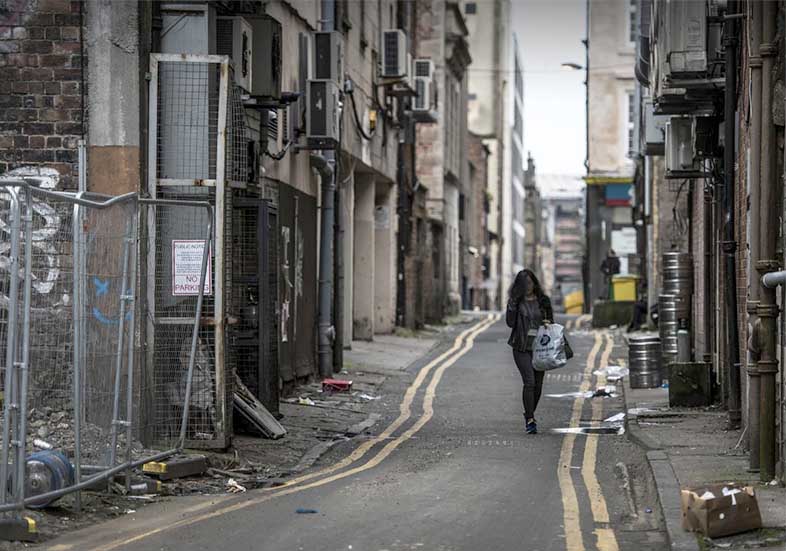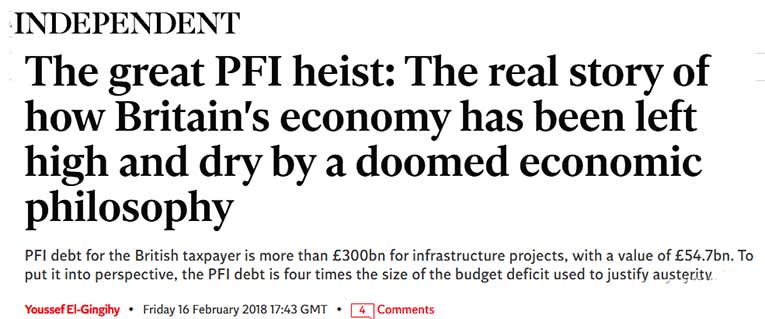
On July 1, days before 34% of Britain’s electorate handed Keir Starmer’s Labour its ‘landslide’ victory, Channel 4 gave its 9 pm prime-time slot to a 47 minute screening of Skint: The Truth About Britain’s Broken Economy. Presented by Tim Harford, it was described by the Guardian’s Hollie Richardson as:
A sobering investigation from the Financial Times’s “undercover economist” and host of BBC Radio 4’s More or Less about the lack of growth in the economy – and why it means younger Britons are no longer expected to be richer than the generation before. After hearing real-life stories and expert insights, Harford asks a crucial question before the polling stations open later this week: how can this be fixed?
It merits a viewing. Crisply lucid, using quantitative and qualitative evidence, it delivers a stark but compelling picture of a broken economy and broken society. Crucially, it locates the nub of the problem in chronically low productivity while emphasising that Brexit hasn’t helped. 1

While productivity falls across the West, Britain’s decline is the steepest
But its answer to the question identified by Ms Richardson – “how can this be fixed?” – is what I’d expect of an FT “undercover economist”. There are too many stark truths which can’t be said here; too many dark alleyways where journalists go at their peril. As I wrote in January 2022, in Monolithic control at the Guardian?
Journalists who know what’s good for them please editors. Editors who know what’s good for them please proprietors. Proprietors – whether Guardian Media Group or the Citizen Kane king-makers of Murdoch, Rothermere and Barclay Bros stripe – not only crave honours and a seat at the high table but, more systemically, are subject to the market discipline of advertising: and in GMG’s case the neo-feudal beneficence of wealthy patrons who need do nothing so vulgar as spell out their expectations. That they can at any moment withdraw their love and turn off the money flows is corruption enough.
We needn’t assume calculated mendacity on the part of media practitioners. Human beings are on the one hand adept at believing what it suits us to believe, on the other have imbibed since infancy – from news media which journalists not only produce but consume, and via education, arts and entertainment industries whose soft propaganda power is underrated – ideologically saturated understandings which (a) take liberal democracy at face value and (b) take it for all its flaws to be the best system achievable by mere mortals.
On soaring levels of UK poverty Harford backs stark claims with hard evidence. But on class – not in the sense of manifest inequality but in the oppositional sense of conflicting interests – he is silent: no small omission when the past half century has seen a decisive shift in the UK, one effected by finance capital which found it more profitable to export manufacturing to Asia and replace it with an economy led by its FIRE – finance, insurance and real estate 2 – sectors.
Hence his silence on the elephant in the room. In Britain tens, and across the West hundreds, of millions have been rendered superfluous to requirement. In political economies premised on the many having to sell their labour power to the few, a billion or more are cast by that export of industry, and by AI technology which in a world planned by and for humankind would be an unalloyed triumph, into or on the cusp of productive irrelevance. Never before has such a thing been known. Who knows what solutions – when the requirements of profit outweigh all other considerations – will be proposed? 3
And, no doubt reluctantly to begin with, implemented?
Tellingly for one seeking a cure for Britain’s ills, Tim Harford ignores Russia’s meteoric recovery on Vladimir Putin’s watch, from the economic basket case of the Yeltsin/IMF disaster capitalism years 4 to the world’s fourth largest economy. And only in passing does he mention China. On which subject, as I wrote a week ago, corporate organs like The Economist and Tim Harford’s FT have spent “a decade and then some” …
… doomsaying China’s impending crash. Why? Because Beijing won’t do as the West – with its rotting inner cities and permanent precariat, its welfare systems at death’s door while a heap of horrors whose fixing should be the alpha and omega of economics go unfixed – counsels. To the bafflement of these geniuses, Xi and his latter day mandarins won’t take their solid gold advice and hand over the beating heart of any modern economy, its banking sector, to the famously farsighted care of rentiers.
To be pedantically clear, that last sentence is sarcasm. China is sternly lectured by the West for not “opening up” its economy, and sneered at by the far left as fully capitalist. The latter, as set out here, is a profoundly mistaken view. By keeping tight control over the flow of finance, China is able not only to plan economic development far into the future but to ensure, albeit at cost of high levels of wealth inequality along the way, that society as a whole benefits.

FB exchange, circa 2018, cited in a post on North Korea 5
State control of the banks is another idea corporate journalists who know what’s good for them won’t touch with a barge pole. (A truth which, besides subverting the fanciful notion of impartial and independent media, underscores the greater truth that “we” are not a democracy. “We” are a creditor oligarchy.) Instead, and I repeat that this three-quarter hour inquiry merits a viewing, Mr Harford’s proposed cure for the chronic underinvestment he rightly sees as driving Britain’s low productivity echoes that of its new Chancellor of the Exchequer, Rachel Reeves. Without coming right out and saying so he, like Ms Reeves, wants a return to the PFI of Tony Blair and Gordon Brown.

If that ‘solution’ was both devastating and quite unnecessary, his answer to the threat to jobs posed by an AI he otherwise (and rightly) welcomes is naive even for an economist. In closing his investigation, Tim Harford makes a plea that technology be deployed with compassion..
Good luck with that Tim, when neither technology nor compassion drive a free market capitalist economy.
* * *
- In a post three years ago I cited another, written the day after the Referendum of June 2016, in which I had written:
Yesterday I gave my pencilled cross to a corrupt institution that only last year condemned millions of Greeks to a poverty they’d done nothing to deserve, and has plotted and connived behind our backs to subvert popular will in the name of TTIP. I voted Remain despite the self serving case made for it by the bulk of the British and international ruling class, and despite finding the arguments of most on the centre left lacking depth and factual knowledge, and frequently illogical with it.
I found the principled case against the EU made by Lexit (socialists for exit) more closely argued and knowledgeable than Remain arguments set out in corporate media and relayed across Facebook and Twitter. What Lexit did not persuade me of, however, was that it had a convincing answer on how, at this particular juncture, leaving the EU will better the conditions of working people. The situation we awoke to this morning was arrived at by a debate whose terms have been framed entirely by atavistic elements and instincts that have nothing to do with workers’ rights or protection of living standards.
(I was overstating the case. Not all media opposed Brexit, and while the most powerful sections of Britain’s ruling class did want a Remain vote, it was more divided on the matter than the above suggests.)
In the more recent post, after citing the above, I added that:
My argument with Brexiteers in general was one familiar to internationalists on many issues, not just the EU. I mean the standard conflation of national and class interests, as though ‘our’ ruling class was somehow more accountable than Europe’s.
My argument with Lexiteers was their refusal to think dialectically and, worse, their disingenuous intoning of the fantasy of revolution in Britain.
- On Britain’s housing shortage Tim Harford bewails its driving up of house prices (while overlooking its inflating of already misleading GDP figures) but fails to note how the law of supply and demand, not in bricks and mortar and land but in the renting out of money in the form of mortgages, further distorts an artificial market and further reduces, since workers must be housed and that fact reflected in wage levels, British competitiveness on global markets. Beyond my scope here but worthy of mention is that this “renting out of money” is not confined to housing. Student debt similarly boosts GDP without doing anything for the real economy – the one that produces actual wealth – while loans to fund corporate raiding by way of share buyouts do actual if not grievous bodily harm to the same.
- Who knows what solutions will be whispered in the homes and haunts of a ruling class whose existence the fatuous deny. Some make their way – thinking the unthinkable – into blue sky papers of selective circulation, with the most successful aired at Davos. Media will deplore or hand-wringingly approve, but either way nudge them to what Tariq Ali called the Extreme Centre of mainstream discourse. By such processes New Normals are established. In my lifetime things once unimaginable – makeshift beds in the shop doorways of every High Street, prisons run for profit, and the denial of welfare benefits for the third child of impoverished parents – no longer shock. Why rule out currently unthinkable solutions to the problem of
useless eatersthe economically inactive? - See Chapters 10-11 of Naomi Klein’s The Shock Doctrine for what was done to Russia in the 90s. Brainwashed by wall to wall media demonising of Putin, Western intellectuals and media know-nothings unable to account for this man’s popularity at home choose instead to ignore or childishly deny it.
- I subsequently saw one far left writer, a man known to and respected by me, attempt to address China’s astonishing achievement while condemning its ‘imperialism’. How? By saying those 800+ million (an extrapolation from the World Bank figure from 2016) had been raised from extreme poverty at the expense of other global south nations. Oddly, he neglected to set out the mechanisms by which 800 million people elsewhere had been cast into extreme poverty to balance the books!
